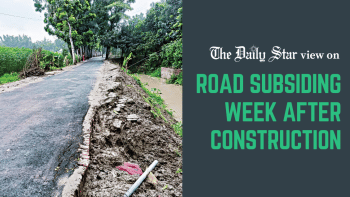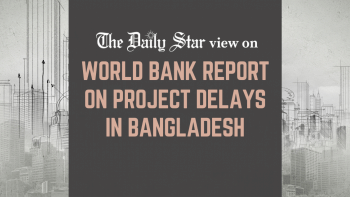A highway caught in perpetual repairs

We are shocked by the levels of indifference, negligence, and corruption that likely went into making a vital road subject to frequent repairs. According to a report by Prothom Alo, the road in question is a 38-kilometre stretch of the Jashore-Khulna highway that is crucial for transporting goods from Bagerhat's Mongla Port to various destinations in the country. Notwithstanding its significance, the highway remains in a perpetually bad shape, having undergone repairs an unbelievable seven times in the last nine years, incurring a total cost of over Tk 400 crore.
Another round of repairs is now underway, but this has only added to people's suffering, with the mix of potholes and patches of loose gravel causing hours-long gridlocks and increasing the risks of accidents and damages. The question is, why would a road's condition deteriorate repeatedly, sometimes within months of a repair work? Both the Roads and Highways Department (RHD) and the contractors responsible for the repairs have, conveniently, shifted the blame onto overloaded trucks. That's a laughable excuse even if not entirely untrue.
Trucks ignoring weight limits do pose a challenge, but whose responsibility is it to ensure that they do not do so? The fact is, shoddy construction, including use of low-quality materials, as well as lax monitoring by the authorities are to blame for this particular road failing to withstand heavy vehicle traffic. Moreover, the weighbridge control centre set up at the highway's Chengutia point in 2022 also remains closed, further cementing its eventual doom.
We are familiar with this pattern of irregularities that has frequently allowed politically backed contractors and corrupt officials to exploit public projects for their own narrow gains. Too often, we have seen new roads deteriorate too quickly, with repairs leading to temporary relief before they inevitably deteriorate again. Against this backdrop, we hope that the recent government move to revive a high-powered task force to check wastage of money in public projects will lead to better accountability. But any such effort must also address the issue of poor quality control in these projects for the sake of the long-term returns of public investments.


 For all latest news, follow The Daily Star's Google News channel.
For all latest news, follow The Daily Star's Google News channel. 









Comments